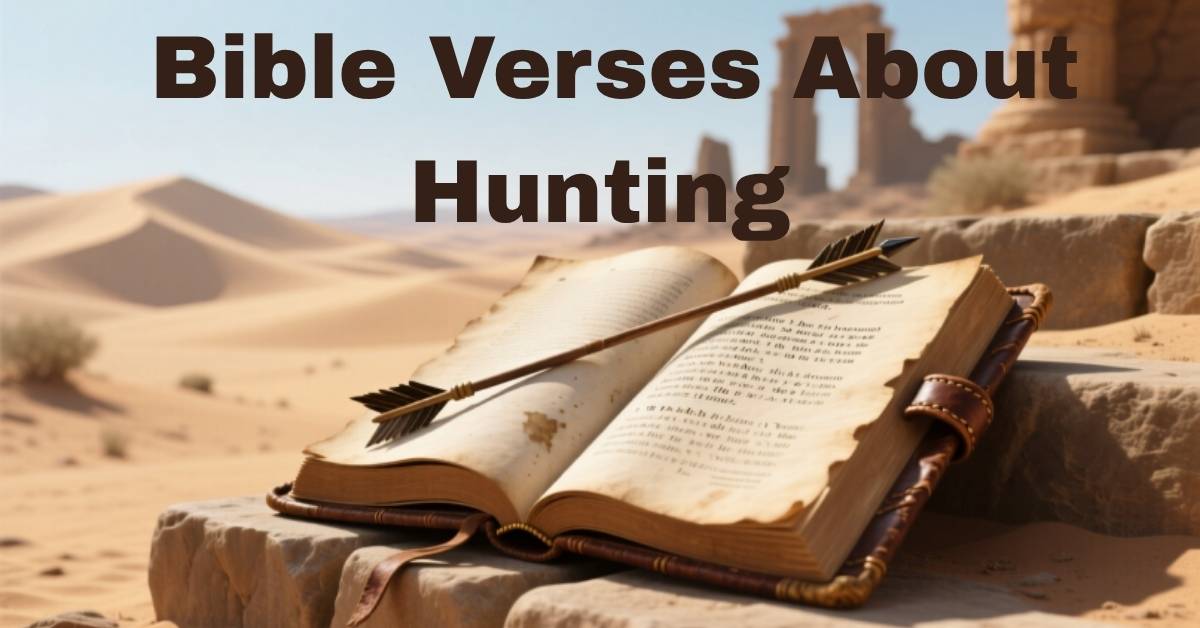Hunting has been part of human life since ancient times, and the Bible mentions it in several verses. It often connects hunting with strength, patience, and skill. Many hunters find peace and reflection in nature while following their faith. These verses remind us that all creation belongs to God and should be respected.
The Bible teaches that hunting can reflect discipline and responsibility when done with the right heart. It also warns against cruelty and greed. Whether for food or tradition, hunting should honor God’s creation. These scriptures guide hunters to act with wisdom, gratitude, and respect.
Top Bible Verses About Hunting
Genesis 10:9
“He was a mighty hunter before the Lord; therefore it is said, ‘Like Nimrod, a mighty hunter before the Lord.'”
This verse speaks of Nimrod’s reputation as a formidable hunter, whose skills were recognized even in the presence of God. It shows that hunting was not only a practical necessity but also a respected ability in ancient times. The reference to being “before the Lord” suggests that his hunting prowess was acknowledged as part of his identity and legacy.
When we think about hunting today, it reminds us that our skills and abilities can be used to honor God and provide for those around us, just as the great hunters of old did for their communities.
Genesis 25:27
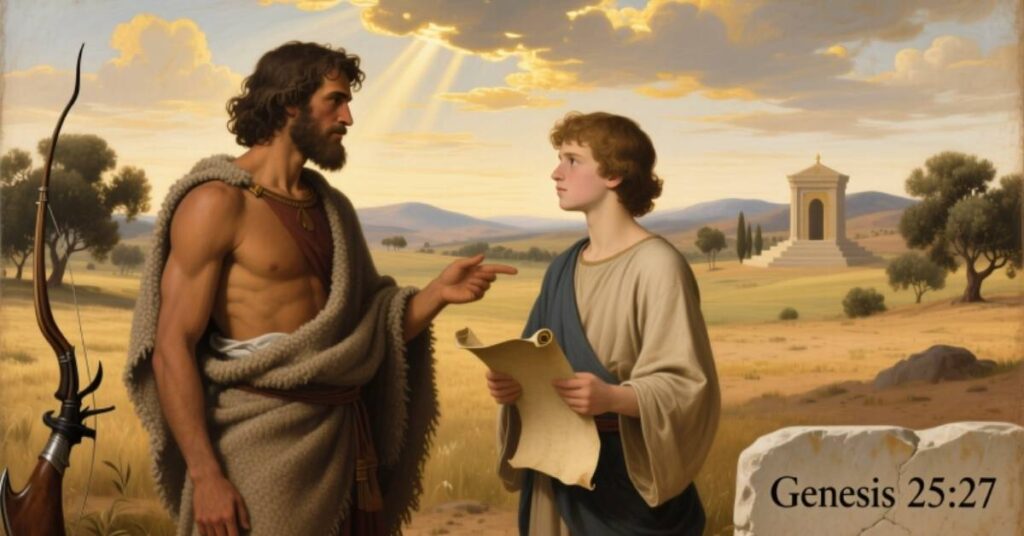
“When the boys grew up, Esau became a skillful hunter, a man of the field, while Jacob was a quiet man, dwelling in tents.”
This passage contrasts two brothers with different callings and skills. Esau’s identity as a skilled hunter demonstrates that hunting was a legitimate and valued profession in biblical times. His expertise in the field provided sustenance for his family and defined his character as an outdoorsman.
This verse encourages us to recognize that God gives each person unique talents, and for some, that includes the ability to hunt and provide through the wilderness.
Genesis 27:3
“Now then, take your weapons, your quiver and your bow, and go out to the field and hunt game for me.”
Isaac’s instruction to Esau shows hunting as a normal family activity with purpose and intention. The use of specific hunting tools, quiver and bow, indicates that hunting required skill, preparation, and proper equipment. This request was made in the context of blessing and family provision.
It reminds us that hunting can be an act of service and love for our families, bringing not just food but also connection and tradition.
Genesis 27:5
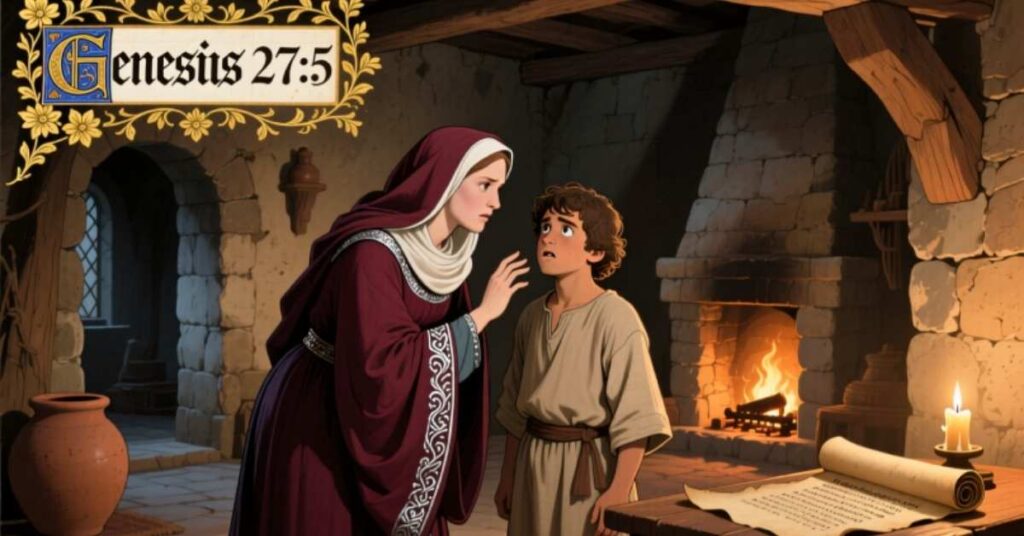
“Now Rebekah was listening when Isaac spoke to his son Esau. So when Esau went to the field to hunt for game and bring it…”
This verse shows hunting as a time-consuming endeavor that took the hunter away from home into the wilderness. It reveals that hunting required patience, dedication, and time spent in solitude with nature. The hunt was significant enough to be woven into the family’s important moments.
For modern hunters, this resonates with the understanding that hunting is more than just the harvest, it’s about the journey, the time invested, and the dedication to the craft.
Genesis 27:33
“Then Isaac trembled very violently and said, ‘Who was it then that hunted game and brought it to me, and I ate it all before you came, and I have blessed him? Yes, and he shall be blessed.'”
This passage demonstrates that hunted game was used in sacred and ceremonial contexts, including blessings. The food from the hunt became part of a significant spiritual moment between father and son. It shows that the fruits of hunting could be incorporated into worship and family covenants.
This teaches us that what we gain from hunting can be offered back to God and used in meaningful ways within our faith journey.
Leviticus 17:13
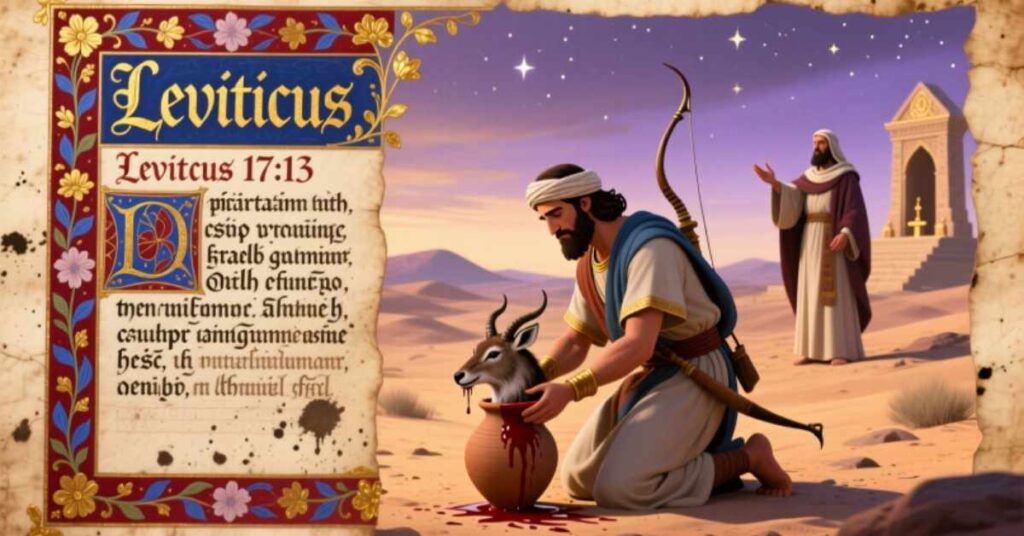
“Any one also of the people of Israel, or of the strangers who sojourn among them, who takes in hunting any beast or bird that may be eaten shall pour out its blood and cover it with earth.”
God provided specific instructions for those who hunted, emphasizing respect for life and proper handling of the game. The requirement to pour out blood and cover it with earth shows that hunting was to be done with reverence and acknowledgment of God’s sovereignty over life. This was a way to honor both the Creator and His creation.
Today, ethical hunting practices and respect for wildlife echo these ancient principles of stewardship and reverence for what God has provided.
Deuteronomy 12:22
“Just as the gazelle or the deer is eaten, so you may eat of it. The unclean and the clean alike may eat of it.”
This verse normalizes the consumption of hunted animals, placing them in the same category as other acceptable foods. Gazelles and deer were common game animals, and their meat was considered a regular part of the diet. The instruction shows that God made provision for His people through the animals of the field.
It affirms that hunting for food is a legitimate and blessed way to sustain ourselves and our families.
Deuteronomy 14:4-5
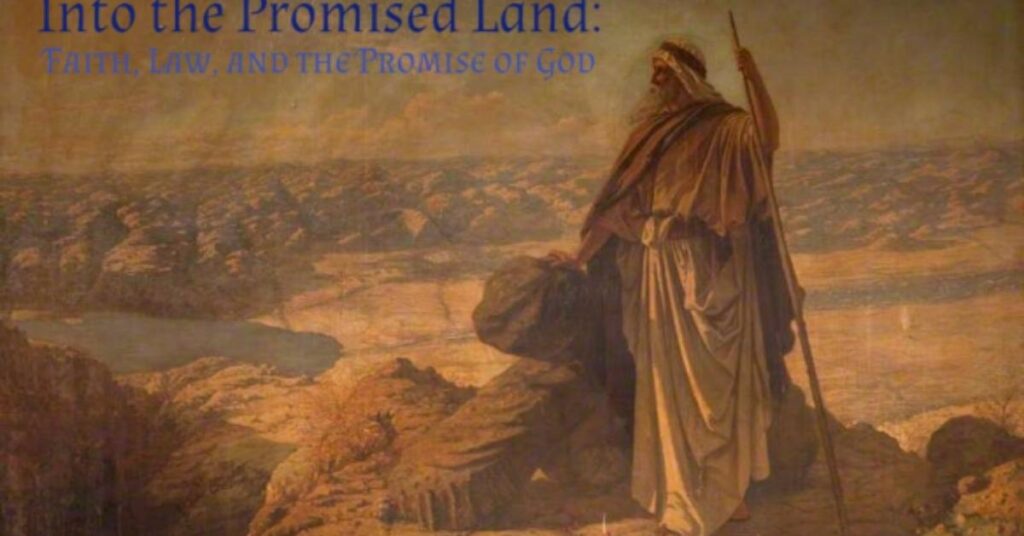
“These are the animals you may eat: the ox, the sheep, the goat, the deer, the gazelle, the roebuck, the wild goat, the ibex, the antelope, and the mountain sheep.”
God clearly outlined which wild animals could be hunted and eaten, showing His care in providing detailed guidance. This list includes numerous game animals that would have been pursued by hunters. The specificity demonstrates that hunting was an established practice with divine regulations.
Knowing what we can hunt and eat helps us practice responsible stewardship of God’s creation while enjoying His provision.
Deuteronomy 14:26
“And spend the money for whatever you desire, oxen or sheep or wine or strong drink, whatever your appetite craves. And you shall eat there before the Lord your God and rejoice, you and your household.”
While not explicitly about hunting, this verse shows God’s desire for His people to enjoy the food He provides, including meat from animals. The freedom to choose what satisfies our appetite, including game meat, is presented as a reason for rejoicing. It emphasizes that provision and celebration go hand in hand.
This reminds us that enjoying the harvest from a successful hunt is not just acceptable but can be an act of worship and thanksgiving.
1 Samuel 24:11
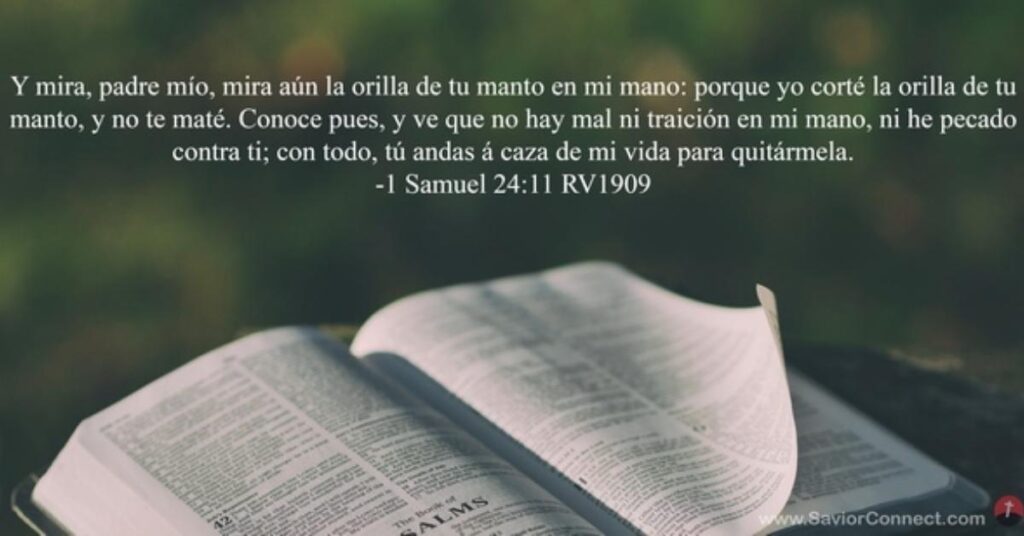
“See, my father, see the corner of your robe in my hand. For by the fact that I cut off the corner of your robe and did not kill you, you may know and see that there is no wrong or treason in my hands. I have not sinned against you, though you hunt my life to take it.”
Though metaphorical, this verse uses hunting language to describe pursuit with intent. It shows that the concept of hunting was well understood, tracking, pursuing, and attempting to capture or kill the target. The imagery would have resonated with people familiar with actual hunting practices.
It reminds us that hunting requires focus, strategy, and persistence, qualities that can be applied to many areas of life.
1 Samuel 26:20
“Now therefore, let not my blood fall to the earth away from the presence of the Lord, for the king of Israel has come out to seek a single flea like one who hunts a partridge in the mountains.”
David compares Saul’s pursuit of him to hunting a partridge, a small bird in the mountains. This metaphor illustrates the difficulty and seeming futility of such a hunt, while also showing that bird hunting was a recognized activity. The comparison reveals familiarity with the challenges hunters faced in pursuing elusive game.
For hunters, this speaks to the humility needed in the field, recognizing that despite our best efforts, success ultimately depends on factors beyond our control.
Job 10:16
“And where my head lifted up, You would hunt me like a lion and again work wonders against me.”
Job uses hunting imagery to describe God’s power and his own feeling of being pursued. The reference to hunting a lion shows the dangerous and intense nature of hunting large predators. This metaphor would have been powerful to an audience familiar with the risks hunters faced.
It reminds us that hunting, especially of dangerous game, requires courage and respect for the power of God’s creatures.
Job 38:39-40
“Can you hunt the prey for the lion, or satisfy the appetite of the young lions, when they crouch in their dens or lie in wait in their thicket?”
God challenges Job by asking if he can hunt like a lion or provide for predators. This rhetorical question emphasizes God’s sovereignty over the natural order and His role as the ultimate provider. It shows that hunting is part of the created order that God established and maintains.
This humbles us as hunters, recognizing that we are participants in a system designed and sustained by God Himself.
Psalm 91:3
“For He will deliver you from the snare of the fowler and from the deadly pestilence.”
The “fowler” is someone who hunts birds using snares and traps. This verse uses hunting imagery to illustrate danger and God’s protective power. Bird hunting with traps was a common practice, requiring skill and knowledge of bird behavior.
For those who hunt, it’s a reminder that just as we use knowledge and skill, we also depend on God’s protection in all our endeavors.
Psalm 124:7
“We have escaped like a bird from the snare of the fowlers; the snare is broken, and we have escaped!”
Again, the image of the fowler (bird hunter) is used to represent danger and entrapment. The breaking of the snare represents deliverance and freedom. This shows that trapping birds was such a common activity that it served as a powerful metaphor everyone could understand.
It teaches us that while hunting involves capturing, we should always be grateful for the freedom and blessings God gives us.
Proverbs 6:5
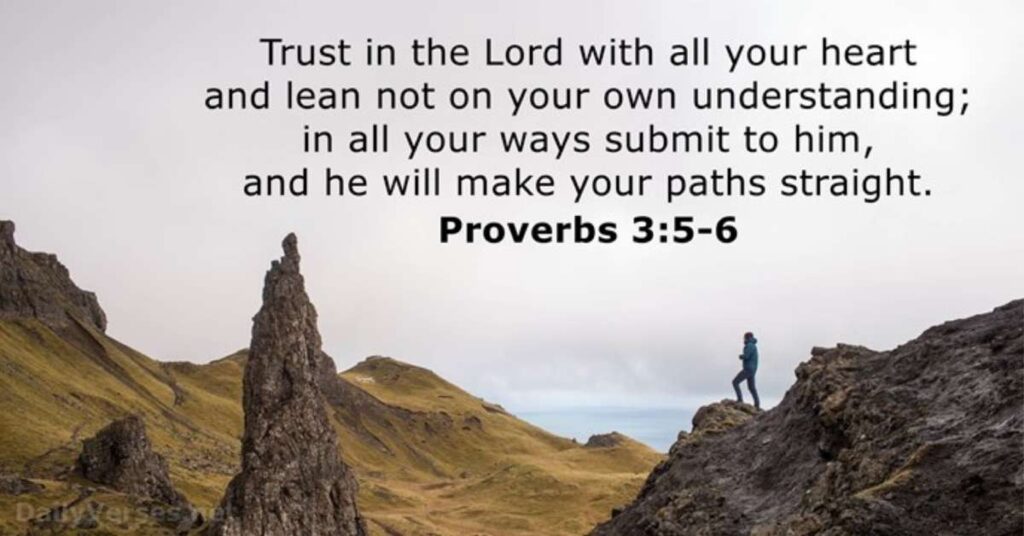
“Save yourself like a gazelle from the hand of the hunter, like a bird from the hand of the fowler.”
This wisdom literature uses hunting imagery to urge quick action and escape from danger. Both the pursuit of gazelles and bird hunting are presented as scenarios requiring urgency. The verse assumes the reader’s familiarity with hunting practices.
As hunters, we understand the pursuit, but we also recognize when we need to be quick and decisive in our own spiritual lives.
Read More: 65 Powerful Midnight Prayer Points for Mercy
Proverbs 12:27
“Whoever is slothful will not roast his game, but the diligent man will get precious wealth.”
This proverb directly addresses hunting and the importance of following through. Catching game is only the first step; the lazy person fails to complete the process by preparing the meat. Diligence in hunting and in life leads to valuable rewards.
This verse challenges hunters to be thorough and responsible, not just in the hunt but in properly caring for and utilizing what God provides.
Proverbs 22:5
“Thorns and snares are in the way of the crooked; whoever guards his soul will keep far from them.”
While “snares” here is metaphorical, it references the actual trapping devices used by hunters. Snares required careful placement and knowledge to be effective. The imagery suggests danger and the need for wisdom to avoid pitfalls.
For hunters using traps, it’s a reminder to be wise and ethical in our methods, respecting both the game and the principles God has established.
Ecclesiastes 9:12
“For man does not know his time. Like fish that are taken in an evil net, and like birds that are caught in a snare, so the children of man are snared at an evil time, when it suddenly falls upon them.”
Solomon uses hunting and fishing imagery to describe life’s uncertainties. The sudden capture of birds and fish illustrates how quickly circumstances can change. This assumes the audience’s understanding of how snares work and their effectiveness.
It reminds hunters of the unpredictability of life and the need to always be prepared, both in the field and spiritually.
Isaiah 51:20
“Your sons have fainted; they lie at the head of every street like an antelope in a net; they are full of the wrath of the Lord, the rebuke of your God.”
The image of an antelope caught in a net represents helplessness and exhaustion. Nets were used to capture larger game animals, and the trapped antelope’s struggle would have been a familiar sight. This hunting imagery conveys the complete inability to escape judgment.
For hunters, it’s a sobering reminder of our own vulnerability before God and the importance of staying right with Him.
Jeremiah 5:26
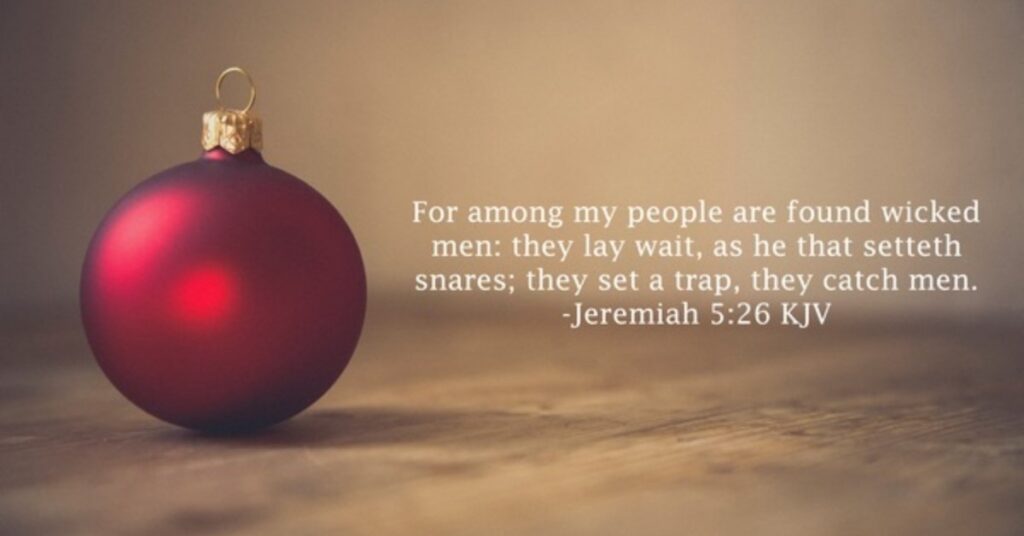
“For wicked men are found among My people; they lie in wait like fowlers; they set a trap; they catch men.”
The prophet compares wicked people to fowlers who set traps for birds. This shows that bird hunting with traps was a recognized profession and practice. The patience and stealth required of fowlers made them an apt comparison for those who plot evil.
This warns hunters to use their skills ethically and never to trap or deceive others in harmful ways.
Jeremiah 16:16
“Behold, I am sending for many fishers, declares the Lord, and they shall catch them. And afterward I will send for many hunters, and they shall hunt them from every mountain and every hill, and out of the clefts of the rocks.”
God speaks of sending hunters to pursue those who have strayed. This verse acknowledges hunting as a skilled activity requiring knowledge of terrain and animal behavior. Hunters knew how to track game even in difficult mountain terrain and rocky hideouts.
It shows that hunting skills, tracking, persistence, and knowledge, are valuable and can be used for God’s purposes.
Lamentations 3:52
“I have been hunted like a bird by those who were my enemies without cause.”
Jeremiah uses bird hunting as a metaphor for persecution. The active pursuit involved in hunting reflects the intensity of his suffering. This imagery would have resonated with people who understood the relentless nature of hunting.
For hunters, it’s a reminder to pursue game ethically and to be people of compassion and justice in all relationships.
Lamentations 4:18
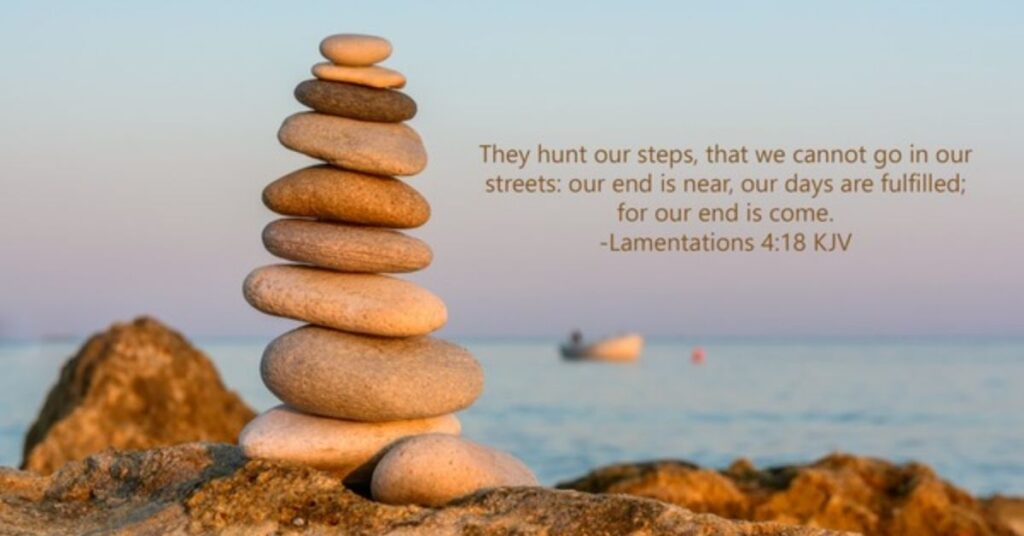
“They dogged our steps so that we could not walk in our streets; our end drew near; our days were numbered, for our end had come.”
While not explicitly about hunting, this describes being tracked and pursued, much like game animals are hunted. The language reflects the experience of being stalked, with the hunter closing in on prey. This would have been a powerful and terrifying image.
It reminds hunters of the responsibility we carry when pursuing game, to do so honorably and with respect.
Ezekiel 13:20
“Therefore thus says the Lord God: Behold, I am against your magic bands with which you hunt the souls there like birds, and I will tear them from your arms, and I will let the souls whom you hunt go free, like birds.”
God condemns those who “hunt souls” using false practices, comparing it to bird hunting. The imagery shows that hunting birds was done with specific tools and techniques. God’s judgment involves freeing those who were trapped, just as a hunter might release captured birds.
This warns against using any skill, including hunting knowledge, for manipulative or harmful purposes.
Micah 7:2
“The godly person has perished from the earth, and there is no one upright among mankind; they all lie in wait for blood, and each hunts the other with a net.”
The prophet uses hunting imagery to describe moral decay. People hunting each other with nets illustrates betrayal and violence. The metaphor assumes familiarity with net hunting techniques used for capturing game.
It challenges hunters to be people of integrity, using their abilities for good rather than harm.
Habakkuk 1:15
“He brings all of them up with a hook; he drags them out with his net; he gathers them in his dragnet; so he rejoices and is glad.”
Though focused on fishing, this verse shows harvesting from nature using nets and hooks. The joy of a successful catch parallels the satisfaction hunters feel. It demonstrates that gathering food from God’s creation was cause for celebration.
This affirms that the satisfaction and joy from a successful hunt are natural and acceptable responses to God’s provision.
Luke 5:5
“And Simon answered, ‘Master, we toiled all night and took nothing! But at Your word I will let down the nets.'”
While this is about fishing rather than hunting, it illustrates the effort and sometimes disappointment involved in pursuing game. The willingness to try again at Jesus’s word shows faith and persistence. These same qualities are essential for hunters.
It reminds us that success in hunting, as in all things, ultimately depends on God’s blessing and timing.
Genesis 9:3
“Every moving thing that lives shall be food for you. And as I gave you the green plants, I give you everything.”
After the flood, God explicitly gave humanity permission to eat meat from animals. This divine authorization includes game animals that would be hunted. It establishes hunting as part of God’s provision plan for mankind.
This foundational verse affirms that hunting for food is not only permitted but part of God’s original design for human sustenance.
Genesis 21:20
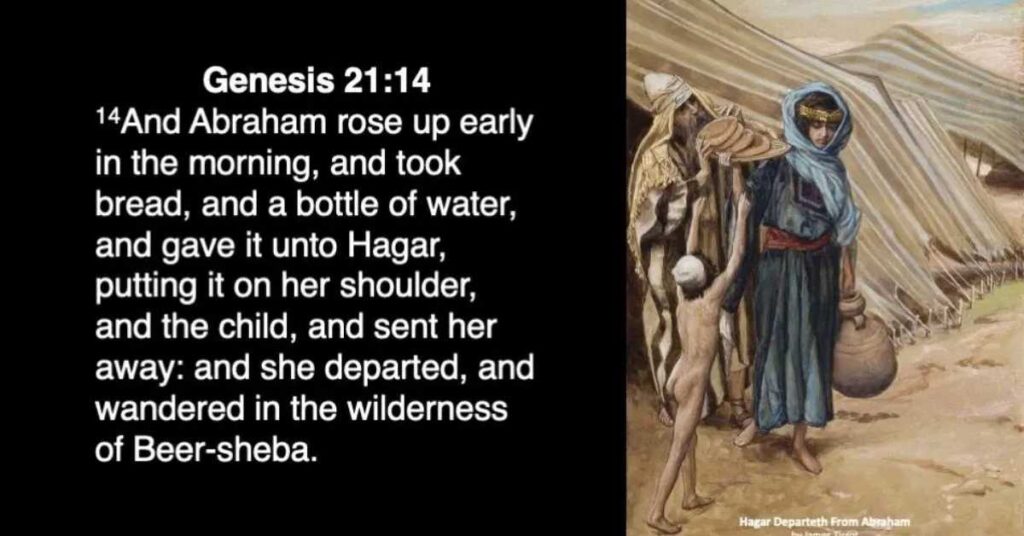
“And God was with the boy, and he grew up. He lived in the wilderness and became an expert with the bow.”
Ishmael’s development as an archer in the wilderness shows that hunting skills were essential for survival. His expertise with the bow would have been used primarily for hunting game. God’s presence with him included the development of these practical skills.
This encourages us to see hunting skills as gifts that can be developed and used with God’s blessing.
Genesis 32:13-15
“So he stayed there that night, and from what he had with him he took a present for his brother Esau, two hundred female goats and twenty male goats, two hundred ewes and twenty rams, thirty milking camels and their calves, forty cows and ten bulls, twenty female donkeys and ten male donkeys.”
Jacob’s gift to Esau included many animals, showing the value of livestock and game in their culture. While not explicitly about hunted animals, it shows that meat and animals were precious resources. For hunters, this context is important for understanding the economic value of game.
It reminds us that the animals we hunt have real value and should be treated as the valuable resources they are.
Exodus 23:11
“But the seventh year you shall let it rest and lie fallow, that the poor of your people may eat; and what they leave the beasts of the field may eat. You shall do likewise with your vineyard, and with your olive orchard.”
God’s provision includes leaving food for wild animals, showing His care for all creation. This rest year would naturally increase wildlife populations, benefiting future hunters. It demonstrates the principle of conservation and sustainable use of resources.
For hunters today, this supports the importance of conservation efforts and sustainable hunting practices that ensure healthy wildlife populations.
Leviticus 11:1-3
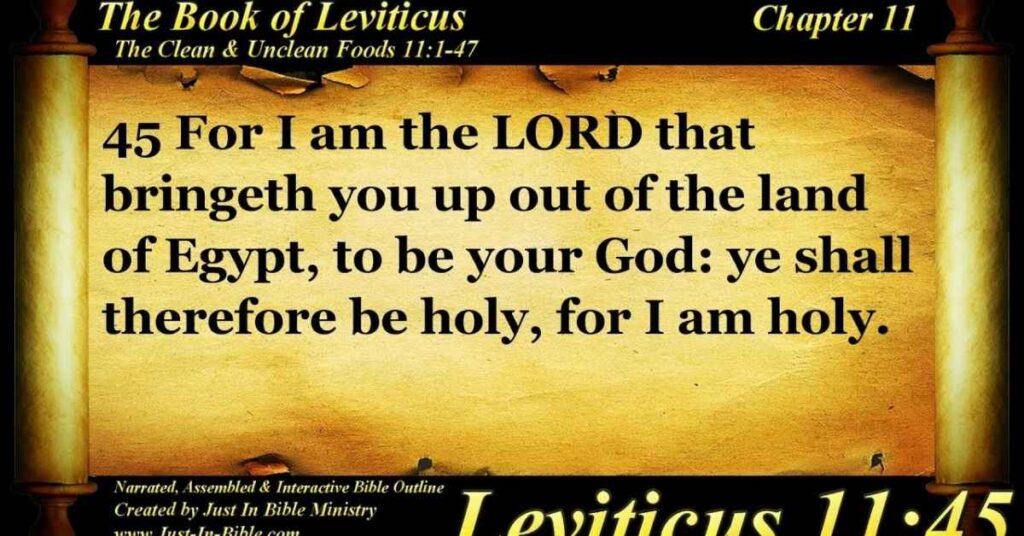
“And the Lord spoke to Moses and Aaron, saying to them, ‘Speak to the people of Israel, saying, These are the living things that you may eat among all the animals that are on the earth. Whatever parts the hoof and is cloven-footed and chews the cud, among the animals, you may eat.'”
God provided detailed dietary laws that included which animals could be eaten. Many of these animals would have been hunted rather than domesticated. The specificity shows God’s involvement in even the practical details of hunting and eating.
This teaches hunters to be discerning and to follow ethical guidelines in what they pursue and consume.
Leviticus 22:8
“He shall not eat what dies of itself or is torn by beasts, and so make himself unclean by it: I am the Lord.”
This command distinguishes between properly hunted game and animals that died naturally or were killed by predators. It emphasizes the importance of hunting methods and meat quality. Hunters were expected to harvest game properly, not scavenge.
This principle guides hunters to pursue fresh, healthy game and to harvest animals humanely and respectfully.
Numbers 11:5
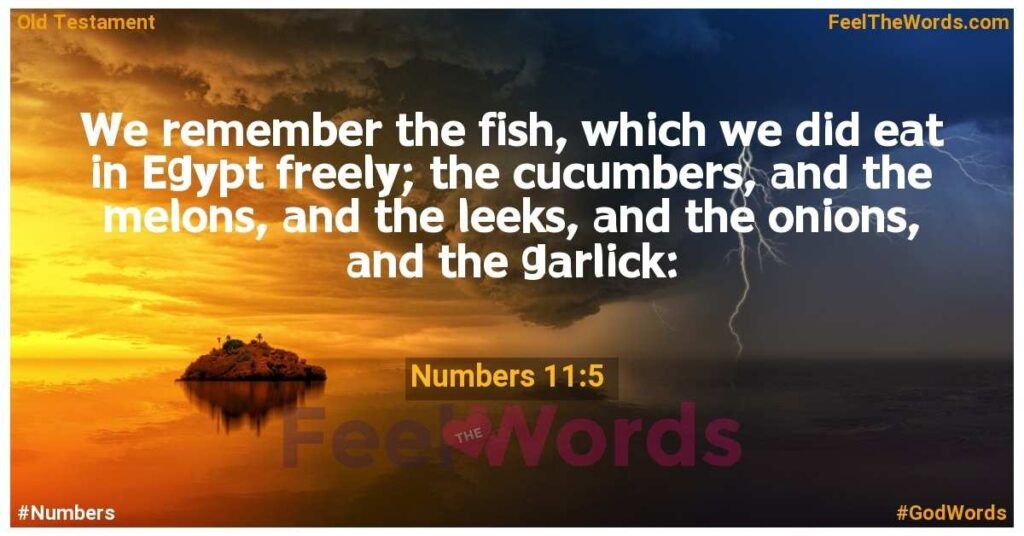
“We remember the fish we ate in Egypt that cost nothing, the cucumbers, the melons, the leeks, the onions, and the garlic.”
The Israelites’ lament includes remembering easily available fish, showing that harvesting from nature was part of their food culture. While not hunting per se, it reflects the broader practice of obtaining food from wild sources. This context helps us understand hunting as part of God’s provision system.
It reminds us to be grateful for the abundance God provides through nature, whether hunted, fished, or gathered.
Deuteronomy 8:7-9
“For the Lord your God is bringing you into a good land, a land of brooks of water, of fountains and springs, flowing out in the valleys and hills, a land of wheat and barley, of vines and fig trees and pomegranates, a land of olive trees and honey, a land in which you will eat bread without scarcity, in which you will lack nothing…”
God’s description of the Promised Land includes abundant natural resources. While not explicitly mentioning game, a “good land” would naturally include wildlife for hunting. This abundance was part of God’s blessing and provision for His people.
For hunters, this reminds us that access to game-rich land is a blessing to be appreciated and stewarded well.
Deuteronomy 12:20-21
“When the Lord your God enlarges your territory, as He has promised you, and you say, ‘I will eat meat,’ because you crave meat, you may eat meat whenever you desire. If the place that the Lord your God will choose to put His name there is too far from you, then you may kill any of your herd or your flock, which the Lord has given you, as I have commanded you, and you may eat within your towns whenever you desire.”
God acknowledges the human desire for meat and provides freedom to satisfy that desire. While this includes livestock, the principle extends to hunted game. The emphasis is on eating meat as a gift from God to be enjoyed freely.
This affirms that hunting to satisfy our desire for meat is acceptable and even anticipated by God.
Joshua 9:4-5
“They on their part acted with cunning and went and made ready provisions and took worn-out sacks for their donkeys, and wineskins, worn-out and torn and mended, with worn-out, patched sandals on their feet, and worn-out clothes. And all their provisions were dry and crumbly.”
The Gibeonites carried provisions for their journey, which would have included dried meat from hunted or slaughtered animals. This shows that preserved game meat was a staple for travelers and was carried on journeys. Hunting provided not just fresh meat but also food that could be preserved.
For hunters, this highlights the value of preserving meat properly so it can provide sustenance over time.
1 Samuel 17:34-36
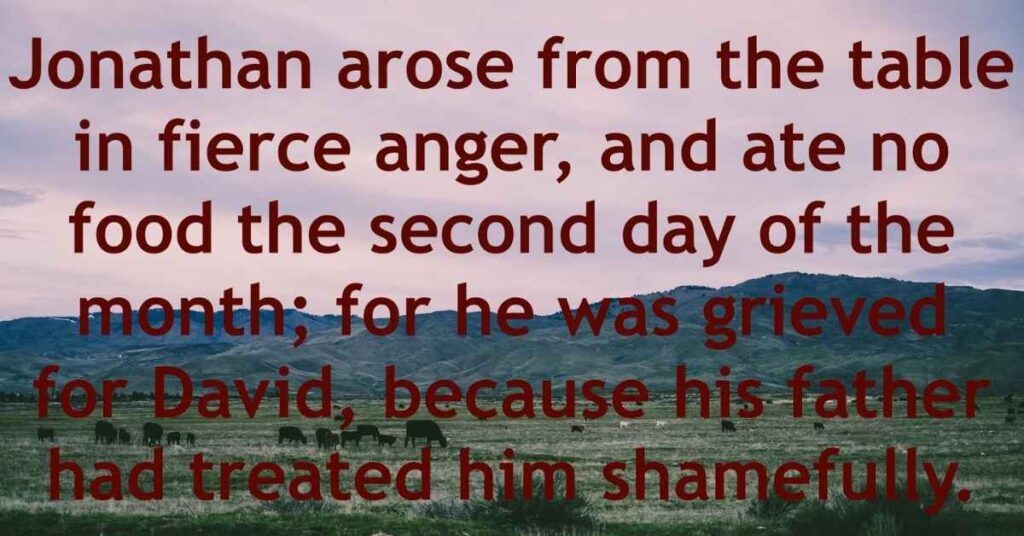
“But David said to Saul, ‘Your servant used to keep sheep for his father. And when there came a lion, or a bear, and took a lamb from the flock, I went after him and struck him and delivered it out of his mouth. And if he arose against me, I caught him by his beard and struck him and killed him. Your servant has struck down both lions and bears…'”
While David was protecting sheep rather than hunting, this passage shows combat with dangerous wild animals. David’s courage and skill in facing predators demonstrate qualities that hunters also need. His experience with wildlife prepared him for greater challenges.
This reminds hunters that encounters with wildlife require respect, courage, and skill, and that these experiences can build character.
2 Samuel 2:18
“And the three sons of Zeruiah were there, Joab, Abishai, and Asahel. Now Asahel was as swift of foot as a wild gazelle.”
Asahel’s speed is compared to a wild gazelle, an animal that would have been hunted. This comparison shows familiarity with the gazelle’s remarkable speed and agility. Hunters would have known how difficult these animals were to pursue.
For hunters, it’s a reminder of the athleticism and endurance required to pursue game successfully.
2 Samuel 23:20
“And Benaiah the son of Jehoiada was a valiant man of Kabzeel, a doer of great deeds. He struck down two aerials of Moab. He also went down and struck down a lion in a pit on a day when snow had fallen.”
Benaiah’s courage in killing a lion in difficult conditions shows that hunting dangerous animals was recognized as an act of valor. This was not ordinary hunting but demonstrated exceptional bravery and skill. Such acts were remembered and celebrated.
This reminds hunters that while we pursue game, we should always maintain the utmost respect for wildlife and never underestimate any animal.
1 Kings 4:23
“Ten fat oxen, and twenty pasture-fed cattle, a hundred sheep, besides deer, gazelles, roebucks, and fattened fowl.”
Solomon’s daily provisions included wild game like deer and gazelles alongside domestic animals. This shows that hunted game was served even at the king’s table and was considered choice food. Hunting provided variety and quality in the royal diet.
This affirms that game meat is valuable and worthy of being appreciated as a premium food source.
1 Chronicles 12:8
“From the Gadites there went over to David at the stronghold in the wilderness mighty and experienced warriors, expert with shield and spear, whose faces were like the faces of lions and who were swift as gazelles upon the mountains.”
Warriors are compared to lions and gazelles, both animals that would have been hunted or observed. The comparison to gazelles emphasizes speed and agility on mountainous terrain. This shows deep familiarity with wildlife behavior.
For hunters, it reminds us to observe and learn from the animals we pursue, appreciating their remarkable abilities.
Nehemiah 5:18
“Now what was prepared at my expense for each day was one ox and six choice sheep and birds, and every ten days all kinds of wine in abundance. Yet for all this I did not demand the food allowance of the governor, because the service was too heavy on this people.”
Nehemiah’s provisions included birds, likely hunted game birds. This was part of feeding many people daily. Hunted birds were a regular part of the diet and food supply, even in times of rebuilding and hardship.
This shows that hunting helped provide for communities, not just individuals, making it a valuable communal service.
Job 39:1-2
“Do you know when mountain goats give birth? Do you observe the calving of the does? Can you number the months that they fulfill, and do you know the time when they give birth?”
God questions Job about his knowledge of wildlife, including animals that would have been hunted. This shows that understanding animal behavior, breeding cycles, and habitats is significant. Hunters would have needed this knowledge to be successful.
For hunters today, this encourages us to be students of wildlife, understanding their patterns and respecting their life cycles.
Psalm 104:21
“The young lions roar for their prey, seeking their food from God.”
Even predators hunt according to God’s design, seeking food He provides. This verse shows that hunting is part of the natural order God established. The lions’ hunting is presented as them seeking provision from God Himself.
This reminds hunters that we are participants in a system designed by God, and our hunting should reflect His wisdom and care.
Psalm 104:27-28
“These all look to You, to give them their food in due season. When You give it to them, they gather it up; when You open Your hand, they are filled with good things.”
All creatures depend on God for food, whether they hunt, gather, or graze. God’s provision through nature includes the prey that hunters pursue. The gathering of food is presented as receiving from God’s open hand.
This cultivates gratitude in hunters, recognizing that every successful hunt is ultimately a gift from God’s generous hand.
Proverbs 30:29-31
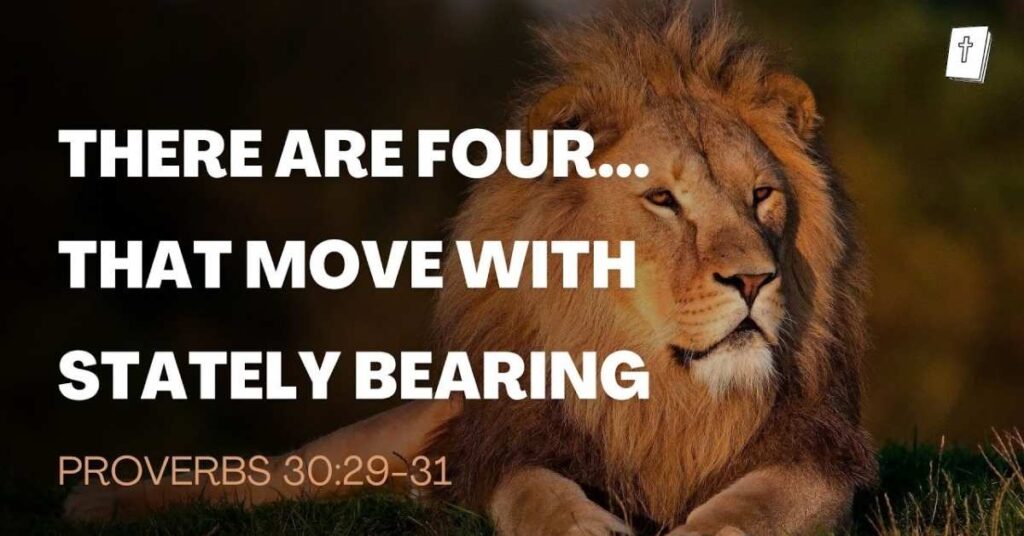
“Three things are stately in their tread; four are stately in their stride: the lion, which is mightiest among beasts and does not turn back before any; the strutting rooster, the he-goat, and a king whose army is with him.”
The lion’s confident movement and dominance are praised. While lions were dangerous and sometimes hunted, this verse celebrates their majesty. It shows appreciation for wildlife’s beauty and strength, qualities hunters also recognize.
This encourages hunters to appreciate the nobility and beauty of the animals they pursue, not just seeing them as targets.
Isaiah 15:9
“For the waters of Dibon are full of blood; for I will bring upon Dibon even more, a lion for those of Moab who escape, for the remnant of the land.”
Lions as hunters and predators represent danger in this prophecy. The imagery assumes understanding of how lions hunt and the threat they pose. This context was meaningful because people lived alongside dangerous wildlife.
For hunters, it’s a reminder that we share the earth with predators and should maintain healthy respect for the power of wild animals.
Jeremiah 12:9
“Is My heritage to Me like a hyena’s lair? Are the birds of prey against her all around? Go, assemble all the wild beasts; bring them to devour.”
Birds of prey and wild beasts are mentioned as hunters and scavengers. This shows familiarity with various predators and their hunting behaviors. The imagery of animals gathering to devour represents judgment and destruction.
This reminds hunters that we are part of a larger ecosystem where many creatures hunt, and we should respect that balance.
Frequently Ask Questions
What does the Bible say about hunting?
The Bible Verses About Hunting show that it can be done with respect and gratitude toward God’s creation.
Are there Bible Verses About Hunting Animals?
Yes, many Bible Verses About Hunting animals teach that hunters should act wisely and avoid cruelty.
Which Bible Verses About Hunting mention famous hunters?
Bible Verses About Hunting mention hunters like Nimrod, known as a mighty hunter before the Lord.
What lesson do Bible Verses About Hunting teach?
Bible Verses About Hunting teach lessons about patience, skill, and respect for God’s creatures.
Do Bible Verses About Hunting allow killing for food?
Yes, Bible Verses About Hunting allow it when done responsibly and with thanksgiving to God.
How do Bible Verses About Hunting show faith in action?
Bible Verses About Hunting show faith by linking discipline, gratitude, and respect for nature.
Are Bible Verses About Hunting related to stewardship?
Yes, Bible Verses About Hunting remind us to be good stewards of the animals and land God created.
Can Bible Verses About Hunting inspire modern hunters?
Bible Verses About Hunting inspire modern hunters to hunt ethically and honor God’s will.
What Bible Verses About Hunting reflect moral values?
Bible Verses About Hunting reflect values of kindness, fairness, and thankfulness in every act.
Why should we read Bible Verses About Hunting today?
Reading Bible Verses About Hunting helps believers understand how to hunt with faith and respect.
Conclusion
Hunting has deep meaning in the Bible, showing the balance between man and nature. It reminds us to be thankful for God’s creation and its blessings. Each verse teaches patience, respect, and wisdom in every hunt. True hunters honor God through their actions and hearts.
These Bible verses about hunting guide us to hunt with care and gratitude. They show that faith and nature can walk hand in hand. When we follow God’s word, every hunt becomes an act of respect. Let every moment in the wild reflect God’s glory and love.


